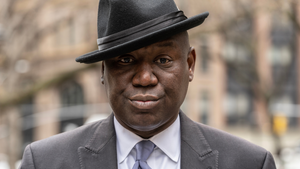Prominent American civil rights lawyer Ben Crump has confirmed he is working on what could be a major legal challenge regarding the way record companies pay streaming royalties to heritage artists.
Speaking to The Times, Crump says: “R&B artists began contacting me saying they believed they were being discriminated against and the music industry was not compensating them fairly. We soon discovered the music industry and the record companies are actually equal-opportunity oppressors - they oppress all the artists, whether they are black, white, hispanic, it doesn’t matter".
There has been much criticism within the artist community over the years about how many record companies interpreted pre-digital record contracts in the context of digital income. Where contracts do not specifically mention how digital revenue should be shared between label and artist, labels need to decide what royalty rate to apply.
Many labels have been accused of unilaterally deciding to apply CD royalty rates - and sometimes even deductions and discounts that applied to CD sales - to digital income, meaning artists end up seeing a small cut of the streaming money generated by their recordings.
There has been much debate as to the legal right of labels to unilaterally interpret old contracts in a self-serving way. Some old record contracts distinguished between sales and licensing income, with a higher rate paid to the artist on the latter. Yet some labels still pay the lower sales rate on streams, even though streaming income clearly stems from licensing deals.
Streaming also exploits an element of copyright called the making available right, which was only added to copyright law in the 1990s. Some have argued that labels should have got explicit permission from each artist to exploit that new element of the copyright, which would have provided the artist a chance to negotiate a new better royalty rate around digital. But in most cases that didn't happen.
There have been some lawsuits in some countries challenging decisions made by labels in this domain, including class actions in the US.
In some cases this has resulted in royalty rates being increased, and certainly some bigger name artists have reached their own confidential settlements that resulted in them getting a bigger cut of the money. And some indie labels have chosen to pay modern streaming royalty rates across their entire catalogues, so heritage artists earn at the same rate as those on new deals.
But there are still plenty of heritage artists receiving a much lower cut of streaming income than would be the norm on a new deal negotiated today.
And, whatever the legalities, many artists argue that it is morally wrong for labels to be applying to streams royalty rates agreed in the context of selling physical discs in an era where no one anticipated how easy it would be to monetise catalogue in future decades.
Crump's colleague Anne Andrews tells The Times: “The royalty payments are being made under terms decided by the record companies. We are unwinding that to try and understand it but we can’t say exactly what they are doing because we haven’t been able to engage them or their accounting departments yet".
Crump and Andrews reckon there might be a case to pursue against the labels for unjust enrichment and they are reaching out to affected artists to help build that case, with plans to talk to UK-based artists too.
Crump concludes: "This is a civil rights issue for all artists. Whoever you are, you have the right to be compensated fairly for your creations".

